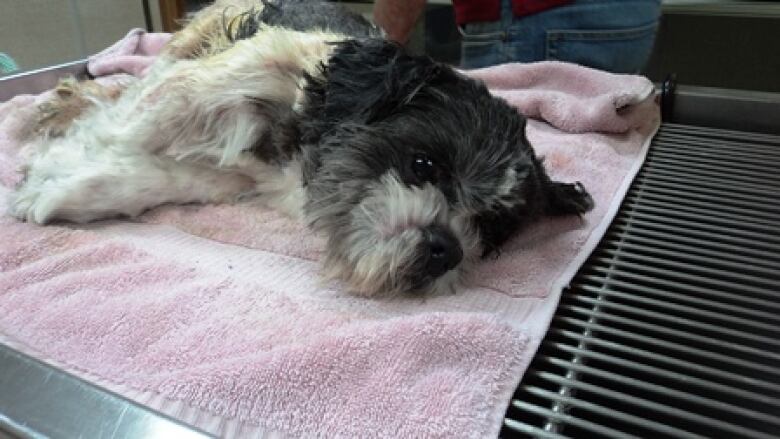Retired veterinarian says more options needed to put down pets
Former veterinarian says expensive fees may make owners take matters into their own hands

A retired veterinarian said the case of a dog left to die in a diaper box outside Terrace highlights the lack of options for those who want to euthanize their pet, but can't afford to do so.
"Some poor soul couldn't afford to have this dog properly taken care of with euthanasia ... and just had to leave it, though that's a rather drastic thing to do," Walter Wigmore told Daybreak North host Carolina de Ryk.
The abandoned dog a sick and elderly male shih tzu was found earlier this week after having been left in a forest for about two days.
The dog was discovered to have a large throat tumour and had to be put down.
A 'DIY' situation
"The first thing to do when you have an animal that's not in good shape or needs help is to take it to a veterinarian, or talk to the veterinarian beforehand and explain the situation," said Wigmore, who used to work at the Vanderhoof Veterinary Clinic.
But Wigmore added that some might not be able to afford the cost of a veterinarian to put down the animal.
"In extreme circumstances, especially where expense is involved, if you can't get the SPCA to do it for free, or some sympathetic veterinarian, then it's a do-it-yourself situation. ...There's just nothing out there," he said.
"It used to be that the SPCA would take care of it all. If you had an extra animal, you'd just take it to them and they would either put it down or find a home for itand that worked well. But now they're trying to save every single animal and that doesn't work out so well."
Wigmoresaid some animals aren't suitable for adoption because they have instincts or a "childhood" that has made them incompatible to live with people.
"We're an animal shelter," says BCSPCA
In response to Wigmore's comments, BC SPCA spokesperson Lorie Chortyk said SPCA shelters are not a place for animals to be euthanized.
"This is what veterinarians are for. We're an animal shelter," Chortyk said.
"Our staff are not legally allowed to euthanize the community's animals. We can certainly take an animal into care and feed that animal."
Chortyk added the SPCA would only euthanize the animals that are already in their care if they are in "critical distress" or so aggressive they can't be safely reintroduced to society.
"Every animal that comes into our care, we do everything we can to save them and find them new homes.If we can save animal lives andfind them new homes, why wouldn't we do that?"
Chortyk said deserting an animal is illegaland the distress it causes an animal could lead to animal cruelty charges.
"We really encourage people to do the right thing by their animalsand seek the help that is there in their community," she said.
Chortyk addedthere may be veterinarians willing to give a discount to those who can't afford the procedure for their pet.
Veterinary procedure costs vary
However, Wigmore said there aren't many veterinarians that offer discounted rates.
"When I was in practice, we did an awful lot of free worka huge amount actually. ... But nowadays, it's more of a business," he said.
Nick Shaw, president of the College of Veterinarians of British Columbia, disagreed withWigmore's claims.
"Many, if not most, veterinarians will offer some type of discountedor even,in the appropriate circumstances,free euthanasiaif they're convinced that the owners are in financial distress."
Shaw said the cost of euthanasia varies, as it involves an exam, the procedure itself, and fees that depend on how the animal's remains are discharged.
He said the cost can also vary widely between practices because the expenseof operating a veterinary practice differs across the province.
However, Shaw said it is a valuable service that veterinarians should be paid for providing.
"The tough thing that we encounter often is that we're in a profession where there's almost an expectation on behalf of the public that services should routinely be provided at little or no costbecause of how our public healthcare system operates."
To hear the full interview listen to the audio labelled: Retired veterinarian says options are few for those who can't afford to euthanize pets












_(720p).jpg)


 OFFICIAL HD MUSIC VIDEO.jpg)
.jpg)



























































































